M*A*S*H Blu-ray Movie
HomeM*A*S*H Blu-ray Movie 
20th Century Fox | 1970 | 116 min | Rated R | Sep 01, 2009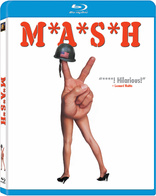
Movie rating
7.3 | / 10 |
Blu-ray rating
| Users | 4.0 | |
| Reviewer | 4.0 | |
| Overall | 4.0 |
Overview
M*A*S*H (1970)
The staff of a Korean War field hospital use humor to keep their sanity in the face of the horror of war.
Starring: Donald Sutherland, Elliott Gould, Tom Skerritt, Sally Kellerman, Robert DuvallDirector: Robert Altman
| Drama | Uncertain |
| War | Uncertain |
| Comedy | Uncertain |
Specifications
Video
Video codec: MPEG-4 AVC
Video resolution: 1080p
Aspect ratio: 2.35:1
Original aspect ratio: 2.35:1
Audio
English: DTS-HD Master Audio 5.1 (48kHz, 24-bit)
Spanish: Dolby Digital 5.1
French: Dolby Digital 2.0 Mono
Portuguese: Dolby Digital 5.1
Thai: Dolby Digital 5.1
German: DTS 5.1
English: Dolby Digital 2.0 Mono (Original)
Subtitles
English, German, Portuguese, Spanish, Cantonese, Danish, Finnish, Mandarin (Traditional), Norwegian, Swedish, Thai
Discs
50GB Blu-ray Disc
Single disc (1 BD)
Playback
Region free
Review
Rating summary
| Movie | 4.0 | |
| Video | 3.5 | |
| Audio | 3.5 | |
| Extras | 3.0 | |
| Overall | 4.0 |
M*A*S*H Blu-ray Movie Review
"Tonight's movie has been 'M*A*S*H.' Follow the zany antics of our combat surgeons as they cut and stitch their way along the front lines, operating as bombs and bullets burst around them; snatching laughs and love between amputations and penicillin."
Reviewed by Casey Broadwater September 4, 2009I’m going to do something terribly cruel. Ready? Okay, here we go. Think of the M*A*S*H theme song. Hum it out loud. Picture the helicopters if need be. Got it? Good. Now, feel free to flood my inbox with all-caps curses when you inevitably can’t get the song out of your head. Since receiving the title for review purposes I’ve had the same problem—whistling the tune in the shower, singing “Suicide is Painless” over and over again, and generally driving my wife up the wall. Director Robert Altman’s then 14 year-old son penned the infectious—and I mean infectious— tune and, ironically, ended up making far more money on royalties from the song than his father made directing the film for Twentieth Century Fox. But that seems par for the course for Robert Altman, whose relationship with the traditional moviemaking system was always marked by box office disappointment and mutual distrust. It was hard for studios to get a handle on the noted cinematic maverick, and for the director’s biting opinion of Hollywood, just check out 1992’s The Player. Altman’s I’ll-do-it-my-way reputation began early. After years of churning out commercial and industrial films, the auteur got his big screen break in 1970 with M*A*S*H, a controversial anti-war comedy that would rattle the conservative industry and establish many of Altman’s directorial trademarks.
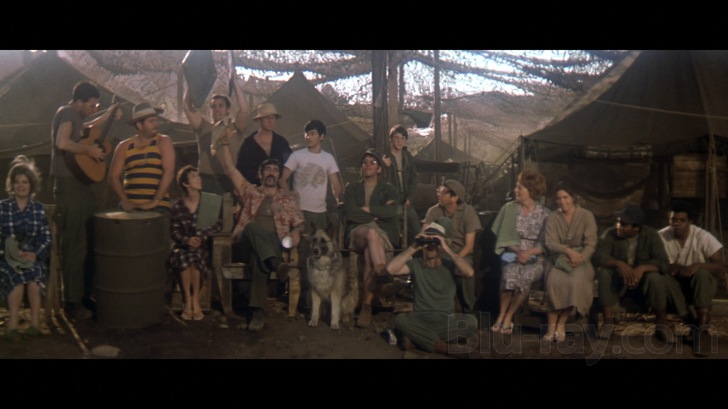
Our motley crew of military misfits...
M*A*S*H is based on a little-read, semi-autobiographical novel by Richard Hooker and was adapted for the screen by the formerly blacklisted Ring Lardner Jr. When Altman got the script—15 directors passed on the project before he signed on—he decided to use it as a rough outline rather than a rubric, a fact that later angered Lardner, even though he eventually won an Oscar for his contributions. The fact is, Altman had a different, more improvisational vision for the material.
Like war itself, M*A*S*H, as a film, is barely organized chaos. The narrative—what narrative there is—is a free-flowing, nebulous series of loosely connected vignettes. Set in a Mobile Army Surgical Hospital on the back lines of the Korean War—a thin front for Vietnam—the story follows the exploits of surgeons “Hawkeye” Pierce (Donald Sutherland) and “Trapper” John McIntyre (Elliot Gould) as they nonchalantly flout Army conventions and escape mentally from the horrors of war by generally acting like buffoons. Like most Altman productions to follow, M*A*S*H features a large, ensemble cast, mostly comprised of cinematic newcomers. In fact, if you watch the credits you’ll notice about twenty-five “Introducing…” tags. Tom Skerritt plays “Duke,” a not-so-genteel southern surgeon, Sally Kellerman is Major Margaret “Hot Lips” Houlihan, the straight-laced but easily unbridled head nurse, and Robert Duval is Major Frank Burns, a lusty, anger-prone holy roller. And these are just the major players. The countless smaller parts are just as well-defined and nearly everyone involved gets a few appearances in the spotlight.
The teaming cast of characters here gave rise to two of Altman’s most distinguishable traits as a director—his use of overlapping dialogue, and the sudden wide-to-tight zooms (and vice-versa) that he would use to narrow in on specific portions of his frequently hectic frames. The motivation behind the layered dialogue is simple, but undeniably clever. One, it’s natural—people talk over one another all the time. More importantly though, by presenting the audience with a cacophony of sounds, Altman is forcing us into an active participation in the film, making the audience mentally dissect the dialogue to determine what is and isn’t relevant. It’s the cinematic equivalent of poking us to make sure we’re still paying attention. The zooms—which seem almost Bollywood-influenced at times—have an effect not unlike haiku, giving us a keyhole view into a larger world. And both techniques, along with the disjointed narrative, serve as ways to highlight the disordered wartime jumble at hand.
Interestingly enough, while M*A*S*H was being made, Fox was also producing Patton and Tora! Tora! Tora!, two films that arguably glorify and patriotize war. The always-leftist Altman settled on the complete opposite approach for M*A*S*H, serving up one anti-establishment dig after another and using black-as-coagulated-blood comedy to underscore the patent absurdities of war in general, but more specifically the unnecessary, politically driven conflicts in Korea and Vietnam. Altman notes in his commentary track that much was made of the film’s crude humor upon its release, but his firm opinion was that there is nothing more obscene or low-brow than the needless destruction of young men at war. The film’s gory surgical scenes stand in stark contrast to the hijinks that occur outside the medical tent, and keep the film from being, as Altman says, “like reading a joke book.” While the film is definitely pointed, it’s impossible to overlook just how funny it is, even today. Altman encouraged his actors to improvise and truly “live” the characters, and the result is a film that’s filled with small, hilarious, impossible to script moments. Even the more staged scenes, like the “last supper” for Walter “Painless” Waldowski (John Schuck)—the “best-equipped dentist in the Army,” if you catch the double entendre—feel like they were tossed together with genius, off-the- cuff intuition.
M*A*S*H Blu-ray Movie, Video Quality 
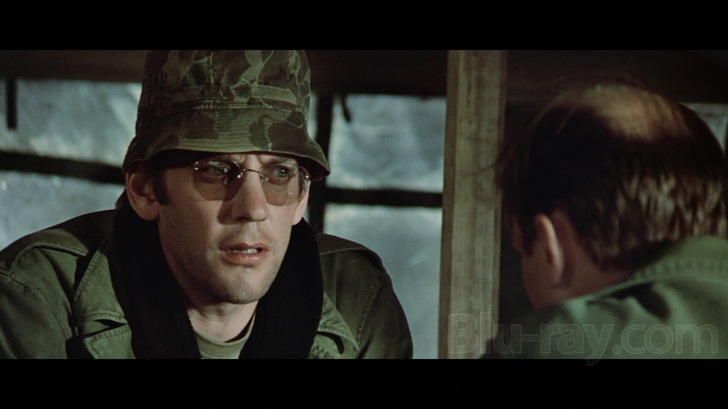
M*A*S*H touches down on Blu-ray with a 1080p/AVC-encoded transfer that looks fairly
good for a nearly 40 year-old catalog title. Purists will be glad to know that the original grain
structure of the film is intact—there's no hastily applied digital noise reduction here—and apart
from a few specks and flecks here and there, the print is in excellent condition. Of course,
compared to today's standards, the film looks incredibly soft and somewhat unresolved—
especially so during
Altman's characteristic long zooms. Altman notes during his commentary track that fog and
diffusion filters were often used on the lenses to keep the film from looking too crisp, so the
softness is either intentional or the result of slightly off focus-pulling, and not any deficiency in
the transfer. There's not much fine detail to be found here in faces or clothing textures, but after
seeing the film for so many years in standard definition, the upgrade in resolution is still
apparent. M*A*S*H has never been super-saturated, and color-wise, the transfer is spot
on, sporting an appropriate Army palette of olive drab and dusty khaki, with the occasional spurts
of bright red blood to liven things up. The image also perks up considerably during the football
game, with red and blue uniforms popping nicely off the screen. Black levels are appropriately
ratcheted through much of the film, preserving details in all but the darkest of shadows and
providing contrast that's not too hot and not too cold, i.e., just right. This isn't the most striking
catalog restoration I've seen—in reality, it doesn't seem like much has been done at all—but
M*A*S*H certainly looks better than ever.
Do note that the 2.40:1 OAR has been cropped down to 2.35:1 here, but the only
time you'll really notice is during the initial title card, where the 'M' and 'H' of M*A*S*H
are partially out of frame.
M*A*S*H Blu-ray Movie, Audio Quality 
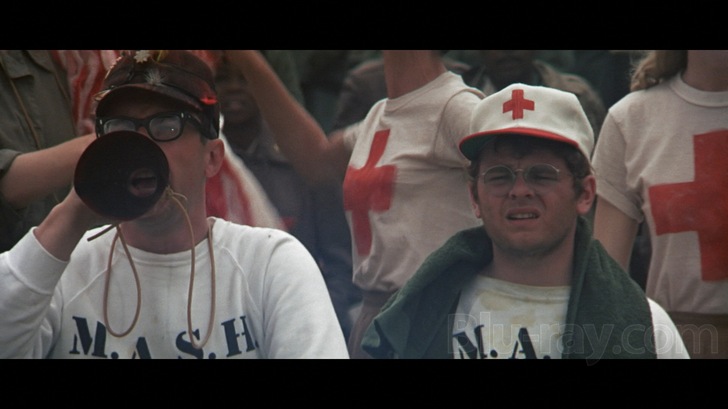
As an audio experience, M*A*S*H definitely shows its age. The film is given a solid DTS-HD MA 5.1 surround track on Blu-ray, but the newly lossless sound can't quite mint a new sonic experience out of dated source materials. Altman's trademark overlapping dialogue has an occasionally muffled and boxy quality, and some of the ADR work is noticeably less than subtle. While the original mono track (which is also included) has been expanded to a 5.1 mix, for all intents and purposes it could be stereo, as there's very limited use of the rear channels. You'll hear some music pumped into the surround speakers from time to time, but I only counted two discrete effects—both the droning of jets panning ever so slightly from one channel to another. The front- heavy presentation can get a little cluttered with the chatter of voices, but this was Altman's intent, and serves as a way to keep audiences actively listening and processing what's going on. Dynamically, the film sounds a bit fuller than in previous incarnations, and even offers up one or two instances of very modest subwoofer use. There's not much to get excited about here, but this DTS-HD MA track does its best considering it's working with original sources that have less-than- pristine fidelity.
M*A*S*H Blu-ray Movie, Special Features and Extras 

Commentary by Director Robert Altman
As much as I like Altman, this track is a bit of a snoozer, with little anecdotes interspersed among
bouts of prolonged silence. I did find it interesting that Altman strongly disliked the
M*A*S*H television series, even going so far as to call it "racist" and the antithesis of
everything he was trying to do with the film. The documentaries included on the disc cover most
of the material here in a more lively fashion, so this one is solely for hardcore Altman
cineastes.
The Complete Interactive Guide to M*A*S*H
Do you like drinking games? If so, this interactive guide could be easily adapted for inebriation
purposes. Basically, when you turn this feature on, an avatar of each character appears
whenever he/she is on screen, and little icons pop up every time someone takes a drink, flirts,
mentions religion, or resorts to violence. There are icons for "suicide, spirits, sanctity,
shenanigans, fisticuffs, court-martials," and of course, an "Altman mumble meter" which appears
anytime there's overlapping dialogue. The tallies get pretty high, so if you're seriously thinking
about making a competition out of this, I'd stick to beer over liquor unless you want to be passed
out by the film's mid-mark.
AMC Backstory: M*A*S*H (SD, 24:27)
This episode of AMC's Backstory chronicles the creation of M*A*S*H, from its
origins as a
little-read, semi-autobiographical novel, through it's turbulent shoot, marked by disagreements
between Altman and his leading men, and finally examining the profound effect that the film had
on both audiences and the moviemaking business. The program features interviews with Robert
Altman, producer Richard Zanuck, film critic Richard Schickle, and many members of the cast.
Ultimately, though, Backstory proves to be redundant, as the special features that follow
are much more in-depth documentaries that cover all the material here and then
some.
Enlisted: The Story of M*A*S*H (SD, 40:53)
While the previous AMC program only scratches the surface of the film's production,
Enlisted digs deeper, with interviews from just about everyone involved, plenty of
interesting anecdotes, and even some archival, behind-the-scenes footage of Altman on set. This
documentary is quite exhaustive, and M*A*S*H fans will find it invaluable.
M*A*S*H: History Through the Lens (SD, 44:08)
While the first quarter of this documentary recycles many of the same interviews from the
previous two segments, it differentiates itself by later focusing on MASH units during the actual
Korean War. History Through the Lens allows several real-life medics, including nurse
Mary
Quinn, surgical technician Eugene Hesse, and surgeons John Howard and Otto Apel—who claims
he was once in surgery for 80 strait hours—to tell their stories and compare the film and
subsequent TV series to their own experiences in the war. You might want to fast-forward
through the first fifteen minutes or so, but once the piece gets going it proves to be an
informative history lesson.
Remembering M*A*S*H: 30th Anniversary Cast & Crew Reunion (SD,
30:02)
In July of 2000, Fox Movie Channel honored Robert Altman with a special legacy award and also
reunited many of the cast and crew members from M*A*S*H for a 30th anniversary
screening of the film. Jack Lemmon and a creepy, over-tanned Harry Belafonte extend their
congratulations to the director via prerecorded video, and then Altman himself takes the stage to
say a few words. "I'm overwhelmed," he says, "and I like being 'whelmed.'" After the screening,
film critic Andy Klein interviews a panel of eight cast and crew members, who discuss the
experience of working on the movie. If you've sat through the previous documentaries you won't
learn much new here, and by this point you may be suffering from redundant information
overload. Still, more is more when it comes to special features, and this reunion is worth
watching if only for the well spoken and always entertaining Robert Altman.
Still Gallery (1080p, 5:44)
While I would have preferred a self-directed version over the video that plays here with one or
two seconds devoted to each photo, this is still an impressive gallery, with lots of great on-set
photography.
Theatrical Trailer (SD, 3:06)
Portuguese Trailer (SD, 3:01)
M*A*S*H Blu-ray Movie, Overall Score and Recommendation 
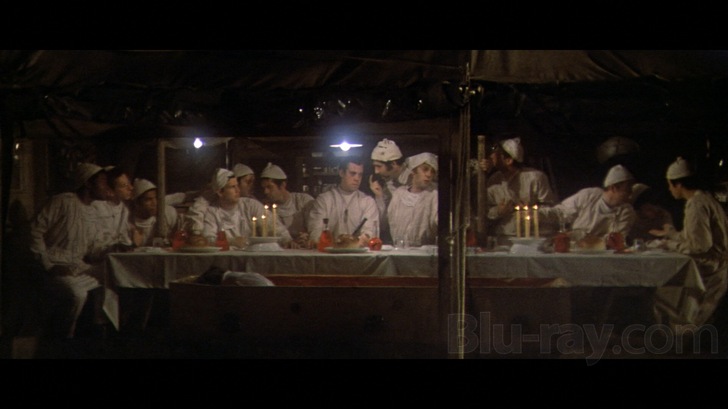
M*A*S*H is a great anti-war film and a stellar comedy to boot, but I have to admit to being one of the few people who have a preferential soft spot for Mike Nichols' Catch-22, which was also released in 1970. Still, it's great to finally have M*A*S*H on Blu-ray, where it looks and sounds great, even if the dated source materials make it less than objectively impressive today. If you're thinking to upgrade from the DVD, I wouldn't hesitate, but do note that most of the special features are the same. On the other hand, if you're one of those few holdouts who have yet to see the film, click the Amazon link above and have your debit card at the ready. M*A*S*H deserves a spot in any discerning Blu-ray collection. Highly Recommended.
Similar titles
Similar titles you might also like

The Great Dictator
1940

Apocalypse Now 4K
Final Cut | 40th Anniversary Edition
1979

The Dirty Dozen
1967

The Deer Hunter 4K
Collector's Edition
1978

Dr. Strangelove or: How I Learned to Stop Worrying and Love the Bomb 4K
1964

The Sand Pebbles
1966

Platoon 4K
Collector's Edition
1986

Full Metal Jacket 4K
Rerelease
1987

The Thin Red Line
1998

Paths of Glory
1957

Coming Home
Reissue
1978

Generation Kill
2008

Punishment Park
1971

The Virgin Soldiers
Limited Edition to 3000
1969

Jarhead
2005

The Bridges at Toko-Ri
1954

The Green Berets
1968

Lions for Lambs
2007

Cross of Iron
1977

Breaker Morant
1980

